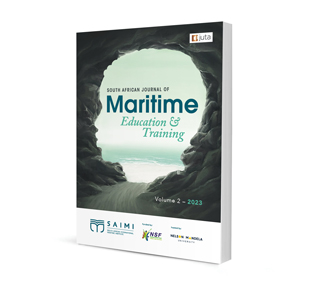
Lack of small business participation (small fishing companies SIC Code 13100) in the Transport Education Training Authority-Supported Schemes
Author: Malcolm Alexander
ISSN: 2790-783X
Affiliations: ETD Practitioner (Maritime), Transport Education Training Authority
Source: South African Journal of Maritime Education and Training, Volume 2 Issue 1, p. 1-24
https://doi.org/10.47348/SAJMET/2023/i1a1
Share
Cite this article
Alexander, M
Lack of small business participation (small fishing companies SIC Code 13100) in the Transport Education Training Authority-Supported Schemes
South African Journal of Maritime Education and Training, Volume 2 Issue 1, p. 1-24 https://doi.org/10.47348/SAJMET/2023/i1a1
Abstract
The study focusses on the transport sector, where company participation level is measured at approximately 20% of levy paying enterprises, and this level is mostly based on relatively high levels of participation from large and medium-sized companies. The study explores the relationship between Sector Education and Training Authorities (SETAs) and the companies within the sectors they are mandated to serve by researching the Transport Education Training Authority (TETA) maritime subsector. The research focus is on small companies and the focus is specifically on the low rate of participation of smaller entities in the skills development landscape. The consequences of the lack of participation are investigated and the study concludes that the SETA’s ability to effectively research its sector skills, as well as the SETAs ability to provide effective skills planning in support of the national agenda, are both negatively affected by current levels of poor participation. The research was conducted on small fishing companies registered with TETA, in order to determine the reasons for low participation in the government’s mandatory grant scheme. The research is survey-based across participating and non-participating small companies. In addition, it is proposed that the elements contained herein are transferable to other subsectors of the transport economy (e.g. air, road and rail), and to the multitude of other SETAs that have small companies registered with them. Succinctly, there is no financial incentive to a small company to participate, the SETAs should consider incentives schemes to increase participation that is project-based and allows for subsidised training. The value of an improved Sector Skills Plan (SSP) that matches the skills needs of the sector increases the likelihood of projects having a meaningful impact on the sector and reduces fruitless and wasteful expenditure in the sector. The small business environment has huge potential to assist in skills development, a skilled workforce, improved productivity and reducing unemployment. The findings and solutions are important tools for taking the maritime development agenda forward.